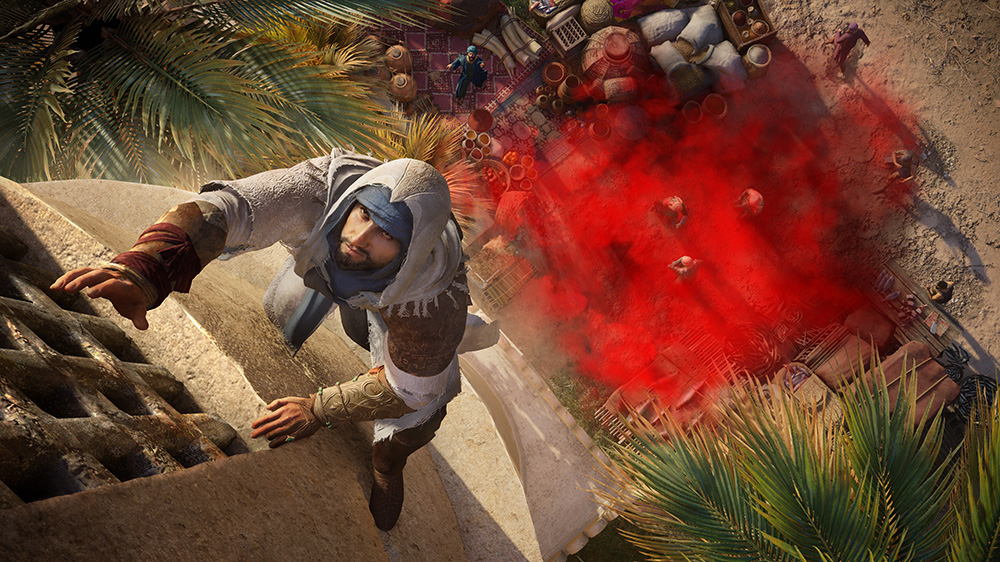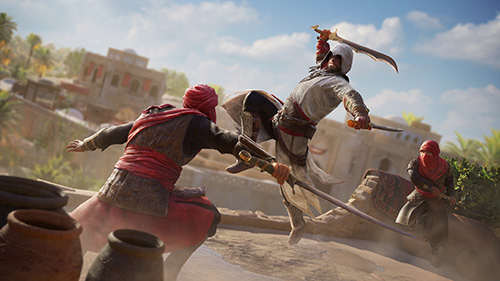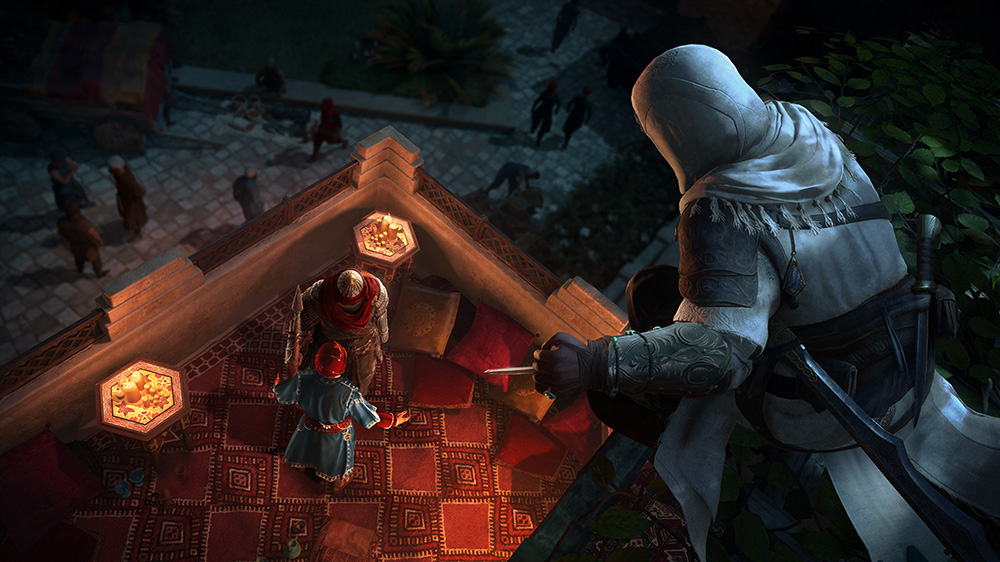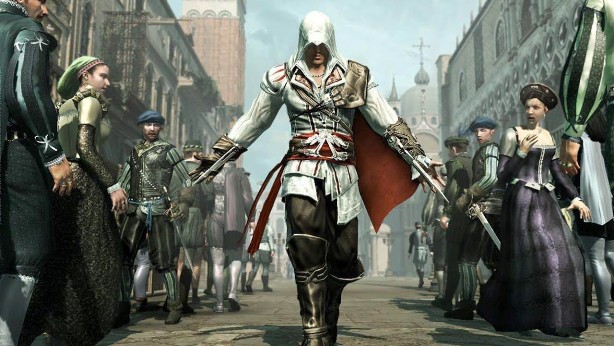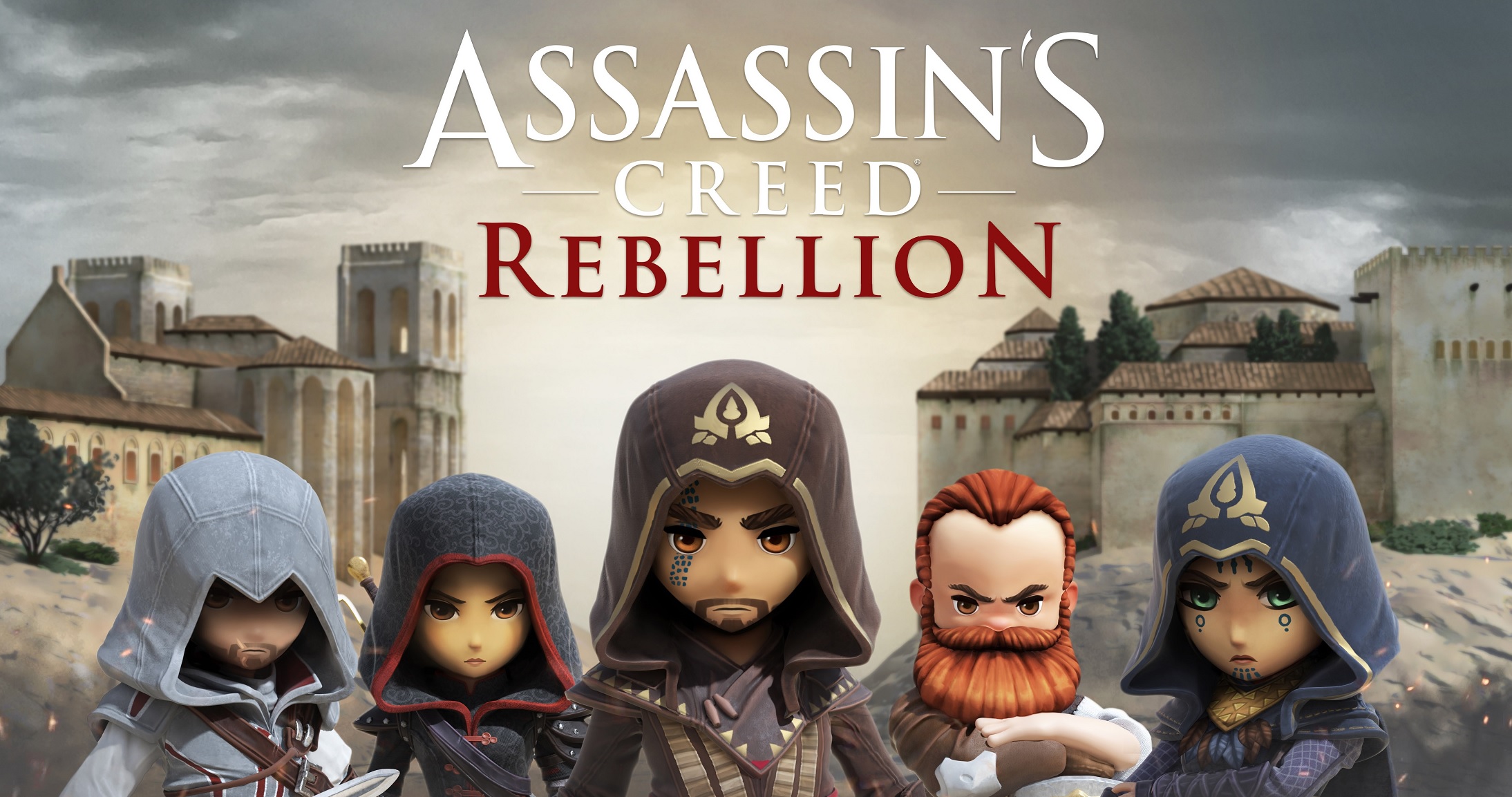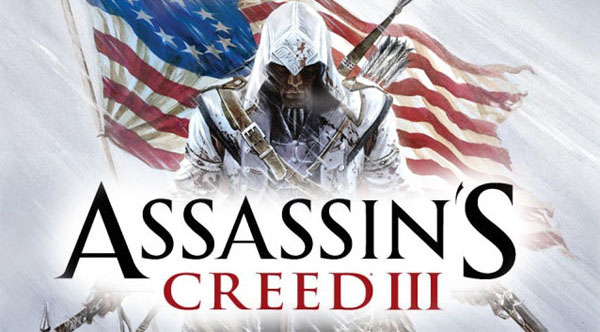
It can be tough being a fan of Assassin’s Creed. What started as a series of historical stealth action-adventures quickly became over-saturated with yearly releases, and plot-threads that were developed then discarded. The series seemed to lack confidence first its storytelling, then in its direction, as it switched genres to open-world action RPGs, with large playing areas and long quests, but little of the climbing and stealth that gave the series its original identity. This resulted in something of a split – ask some fans where the series peaked and they’ll say with the stealth-action of Assassin’s Creed 2-Brotherhood-Revelations, while others will insist the massive RPG world of Assassin’s Creed Odyssey was the most impressive.
Here’s where Assassin’s Creed Mirage enters the picture, both the latest main instalment of the series and a throwback to its pre-2017 entries. The experience feels like Ubisoft giving ground to the ardent fans of its original output, stripping back the experience from covering an entire country to a single city, with several mechanics returning to the series’ roots. What results is a more focused adventure that feels like a mesh between the Assassin’s Creed of old and new.
Mirage feels unique among the series in that the present-day storyline that advances with each instalment is kept out of the main narrative. Instead, we stay in the past in the 9th century, following Basim as he advances through the ranks of the ‘Hidden Ones’ (who will later become known as the Assassin’s Brotherhood). Basim will be known to players who completed Assassin’s Creed Valhalla as having some special qualities to him, but here we get to see his origins as he begins life a thief and street rat, before entering the brotherhood and finding purpose, all while haunted by visions of a strange ‘djinni’.
The story follows the basic (and successful) pattern laid out by Assassin’s Creed II, in introducing a charismatic protagonist ably performed by Lee Majdoub. The structure resembles a truncated version of the last few games, with a web of masked villains from the ‘Order’ who must be identified through various side-quests, before they can be assassinated one-by-one to lead to the mastermind behind it all. And, of course, there are the usual ancient technological relics which are driving the whole thing. The story itself is serviceable, if nothing we haven’t seen before from an Assassin’s Creed game, but does make better use of its location than some of the more recent games, with Baghdad’s reputation as a centre for scholars and commerce forming major parts of some of the questlines in the game.
The assassinations themselves are enjoyable, with each target generally needing to be enticed out of hiding before they can be taken down. A new ‘Focus’ feature allows Basim to build up a special meter that essentially lets him ‘auto-assassinate’ several targets in a row. It does take a bit of strategy out of things, but it’s also very useful in taking down a group of baddies that would otherwise result in a scrap, and I did fall back on using it more often than I promised myself I would.
As a return to the stealth-action gameplay of earlier entries, Mirage does away with levelling, weapon types and much of the grinding that took up dozens of hours in games like Odyssey. Instead, Basim just has access to his hidden blade, a sword and his knife. There are several types of sword and knife that can be equipped and upgraded for various effects, but nothing like the different weapon types from recent RPG games. Combat also feels like a mix of modern AC and a throwback. Enemies come in three variations, weaker sword-wielding enemies who can be parried and instantly killed, reminscent of easy chain-kills in early games. Pole-wielding varieties need a few extra hits from you before you can parry and kill. Finally, heavies have very short parry-windows and must generally be circled-around and worn down. Like much of the rest of the game, this feels like a nice compromise, even if it does simplify combat.
Basim progressess in a much more linear fashion than the RPG games, reaching various stages of Assassin-hood like ‘Initiate’ or ‘Apprentice’ at various points in the story, with the game advising you on what areas may be more suitable for your current status, although you can explore anywhere you like in the city or desert areas surrounding Baghdad. A range of returning tools also feature, including my favourite – the blowdart, although my favourite upgrade for it (the beserk dart) took far too long to unlock. The eagle which has been a staple since Origins also returns, this time in the form of Enkidu, who can help target specific objectives from a height and is used in conjunction with Basim’s inherent ‘Eagle Vision’ ability to see through walls.
Beyond the main story are a host of side activities, although for me there wasn’t a lot that I found too compelling. There are faction contracts you can undertake which reward you with faction tokens for various groups around Baghdad. These are useful for making other missions easier, such as bribing characters in the campaign, or paying mercenaries or merchants to provide backup or distractions. Cuter are the ‘Tales of Baghdad’ which you can randomly come across in various areas of Baghdad, which add some character and flavour to the environment, although they are few and far between. There’s also ‘shards’ which can be pickpocketed from various people around Baghdad to unlock some higher level gear, but this isn’t very inherently interesting.
The running theme through all this is that Assassin’s Creed Mirage is an able mix of old elements and current Assassin’s Creed trends, albeit with the balance decidedly tipped in favour of the traditional. What results is a welcome return to what feels more like what an Assassin’s Creed game should be, prowling about scenic ancient cities, sneaking out of cover to take down targets and generally being an unstoppable, stealthy force. It also means that there’s not a lot here that feels fresh or new, even if it’s been a long time since we’ve seen them, from the familiar story to the climbing and stealth mechanics. It feels like a course correction rather than a progression within Assassin’s Creed’s genre, but one that’s still a good deal of fun for the Assassin’s Creed faithful.
This review is based on pre-release review code for PS5 provided by Ubisoft.
-A welcome return to traditional Assassin's Creed mechanics -A straightforward past-focused story and lots of interesting Baghdad sights to explore -Not as tedious or grindy as recent Assassin's Creed RPG games
-While it does revel in traditional mechanics and a familiar story, that also means that there's little here that feels new and fresh to longtime fans.

